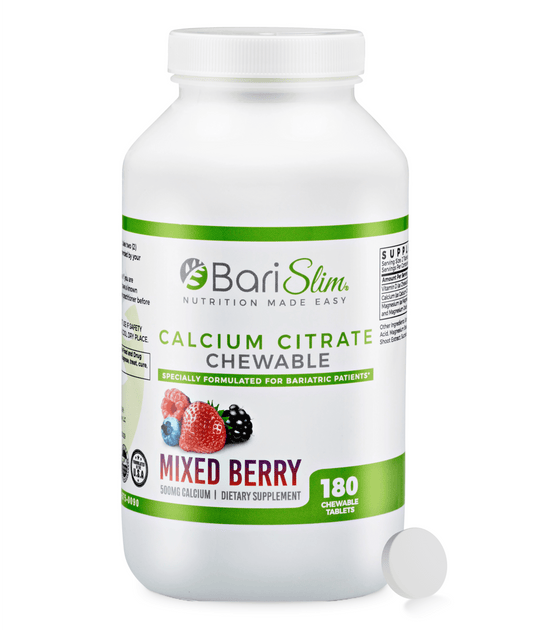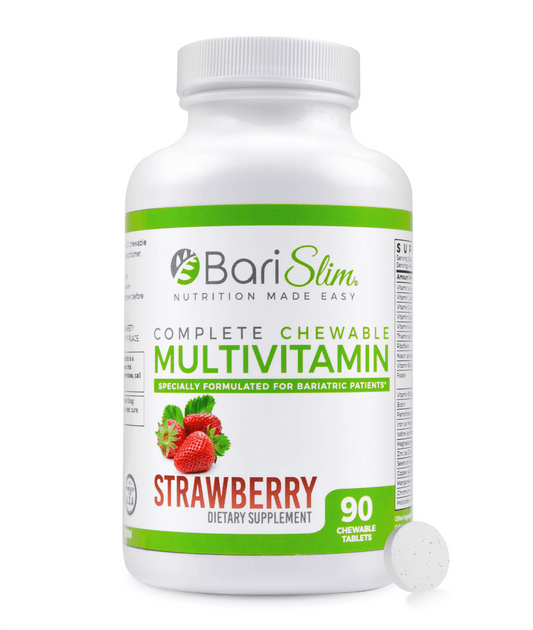Table of Contents
- Do You Need to Take Bariatric Vitamins After Surgery?
- What's the Difference Between Bariatric Multivitamin and Regular Vitamins?
- Avoiding Nutrient Deficiencies After Bariatric Surgery
- The Best Vitamins & Supplements to Take After Bariatric Surgery
- B Vitamins
- Calcium
- Vitamin D
- Zinc & Copper
- Iron
- How Long Do I Have to Take Vitamins Post-Op?
As a bariatric surgery patient, you may wonder if bariatric vitamins are necessary for your post-operative journey. Since weight loss surgery often involves a significant change in your diet and lifestyle, ensuring you receive the required nutrients is crucial to maintaining your overall health. In this article, we will explore the importance of bariatric vitamins and whether they are essential for individuals who have undergone bariatric surgery.
Surgeons and medical professionals, including the American Society for Metabolic and Bariatric Surgery, emphasize the significance of proper nutrition following weight loss surgery. The lifestyle changes necessary for success after surgery may limit the intake and absorption of certain essential nutrients, and this is where the role of bariatric vitamins comes into play. These supplements are specifically designed to meet the nutritional needs of bariatric surgery patients and help avoid any deficiencies that could lead to health complications.
While individual needs may vary, it is crucial to understand the vital role that bariatric vitamins can play in your post-operative life. Incorporating them into your daily regimen, as advised by your healthcare team, can contribute significantly to achieving a balanced diet and ensuring your long-term well-being.
Do You Need to Take Bariatric Vitamins After Surgery?
Yes, it is necessary to take bariatric vitamins after surgery. After bariatric surgery, your body's ability to absorb essential vitamins and minerals may be compromised, making it crucial to supplement your diet with bariatric-specific vitamins. In this section, we will discuss the importance of vitamins and minerals for bariatric patients and how to ensure you are getting the essential nutrients needed for your health and well-being.
Role Of Vitamins And Minerals
Vitamins and minerals play a crucial role in keeping your body functioning at its best. As a bariatric patient, you are at a higher risk of developing deficiencies as a result of the changes in your digestive system after surgery, such as reduced stomach size and altered absorption capabilities. Common surgeries like gastric bypass and sleeve gastrectomy can often lead to deficiencies in vitamins and minerals, including vitamin B12, iron, and calcium, which are essential for maintaining the well-being of your body.
To avoid these deficiencies, it is recommended that you supplement your diet with specific bariatric vitamins post-surgery. Here are some of the essential vitamins and minerals you need to pay close attention to:
- Vitamin B12: Necessary for brain function, blood cell production, and energy levels
- Iron: Vital for your immune system, oxygen transport, and cell growth
- Calcium: Important for maintaining strong bones and teeth, nerve function, and muscle function
- Vitamin D: Supports bone mineralization and calcium absorption
Incorporating these essential vitamins and minerals into your diet in the form of bariatric vitamins can help ensure that you meet your daily requirements. It's crucial to consult with your healthcare provider or dietitian to determine the appropriate supplements and dosage for your individual needs. Regular blood tests can help monitor your nutrient levels and adjust your supplementation as needed.
In conclusion, taking bariatric vitamins after surgery is a critical step in maintaining your overall health and preventing nutrient deficiencies. Discuss your individual needs with your healthcare team and follow their guidance to ensure you're getting the essential vitamins and minerals your body needs to thrive after bariatric surgery.
What's the Difference Between Bariatric Multivitamins and Regular Vitamins?

It's important to understand the differences between bariatric multivitamins and regular vitamins when considering vitamin supplementation after bariatric surgery. The main distinctions involve the formulation, dosage, and absorption rates.
Firstly, bariatric multivitamins are specifically designed for individuals who have undergone weight loss surgery. These operations can alter the body's ability to absorb nutrients from food, making it crucial for patients to supplement with the appropriate vitamins and minerals. Bariatric multivitamins contain higher levels of essential nutrients, such as vitamin B12, folate, iron, calcium, vitamin D.
On the other hand, regular multivitamins are formulated for general health maintenance and don't provide the same high concentration of specific nutrients needed by bariatric patients.
Another difference between bariatric and regular multivitamins is the form they come in. Bariatric multivitamins are typically available in chewable tablets, capsules, or liquid form. These formats offer superior absorption to standard vitamin tablets or gummy vitamins, which may be less effective for bariatric patients.
To compare the differences in nutrients provided, let's look at a typical bariatric multivitamin versus a regular multivitamin:
|
Nutrient |
Bariatric Multivitamin |
Regular Vitamin |
|
Vitamin B12 |
1000 mcg |
6 mcg |
|
Folate |
800 mcg |
400 mcg |
|
Iron |
45 mg |
18 mg |
|
Calcium |
1200 mg |
1000 mg |
|
Vitamin D |
3000 IU |
800 IU |
As seen from the table, bariatric multivitamins provide significantly higher levels of certain nutrients in comparison to regular multivitamins. This is essential for ensuring that bariatric patients receive the necessary nutrients to maintain their health post-surgery.
In conclusion, both bariatric and regular multivitamins serve their distinct purposes. Bariatric multivitamins are specially created for individuals who have undergone weight loss surgery, as they often require higher doses of essential nutrients. Regular multivitamins, while beneficial for general health, may not provide the adequate levels of nutrition necessary for bariatric patients. Always consult your healthcare provider to determine the best vitamin regimen for your unique needs.
Avoiding Nutrient Deficiencies After Bariatric Surgery
After bariatric surgery, your body may have difficulty absorbing all the nutrients it needs. This is because your stomach has been altered, which can lead to nutrient deficiencies. To reduce the risk of complications and maintain optimal health, you should take bariatric vitamins to supplement your diet.
Common deficiencies after bariatric surgery include:
- Vitamin B12
- Iron
- Calcium
- Vitamin D
- Thiamin (vitamin B1)
These deficiencies can lead to various symptoms and health issues, such as anemia, osteoporosis, neurological problems, and even heart failure. To avoid these complications, you should work closely with your healthcare team to ensure you're getting the right nutrients in the right amounts.
To ensure proper absorption and prevent nutrient deficiencies, consider the following tips:
- Choose bariatric-specific supplements: These are designed to be more easily absorbed by your body, helping you get the nutrients you need even with your altered stomach.
- Split doses: Taking your vitamins in smaller, divided doses throughout the day can help improve absorption and prevent gastrointestinal discomfort.
- Monitor blood levels: Regular blood tests can help identify any deficiencies early, allowing you to adjust your supplement regimen accordingly.
One common deficiency to be aware of is thiamin deficiency, which can lead to Wernicke-Korsakoff syndrome, a serious neurological disorder. Symptoms of thiamin deficiency include confusion, loss of muscle coordination, and vision problems. Early intervention is crucial, so consult your healthcare provider immediately if you suspect a thiamin deficiency.
By taking the necessary precautions and following your healthcare team's advice, you can minimize the risk of nutrient deficiencies after bariatric surgery. Remember that bariatric vitamins are an essential part of your post-surgery routine, and maintaining proper nutrient levels will help ensure your long-term health and success.
The Best Vitamins & Supplements to Take After Bariatric Surgery

Multivitamins play a significant role after bariatric surgery, as your body may struggle to absorb nutrients from food alone. Choose a complete multivitamin that contains vitamins A, D, E, and K, and essential minerals. Take one or two doses daily, as recommended by your healthcare provider.
Your body may require additional calcium after surgery to support bone health and reduce the risk of osteoporosis. Opt for calcium citrate supplements since your body more easily absorbs them. Aim for a daily intake of 1,200 to 1,500 mg of calcium, ideally split into two doses.
B Vitamins
B vitamins play a crucial role in maintaining good health and well-being. They directly impact your energy levels, brain function, and cell metabolism. In this section, we will discuss the importance of B vitamins for individuals who have undergone bariatric surgery.
Bariatric surgery can affect the absorption of essential nutrients, including B vitamins. As a result, you need to monitor your intake of these vitamins post-surgery. Several B vitamins are particularly crucial for bariatric patients:
- Vitamin B1 (Thiamine): Thiamine is responsible for converting nutrients into energy. A deficiency in this vitamin can lead to symptoms such as fatigue, muscle weakness, and memory problems.
- Vitamin B6 (Pyridoxine): This vitamin plays a significant role in protein metabolism and the production of red blood cells. Deficiency can cause skin rashes, mood swings, and weakened immune function.
- Vitamin B9 (Folic Acid): Folic acid is essential in the formation of red blood cells and the prevention of neural tube defects in infants. Inadequate levels can lead to anemia, heart palpitations, and birth defects during pregnancy.
- Vitamin B12 (Cobalamin): Vitamin B12 aids in red blood cell formation, neurological function, and DNA synthesis. Deficiency can cause symptoms such as fatigue, dizziness, or tingling sensation in the hands and feet.
To ensure that you are receiving adequate amounts of these vital nutrients, consider incorporating the following dietary sources into your meal plan:
- Thiamine: whole grains, legumes, nuts, and seeds
- Pyridoxine: poultry, fish, bananas, and chickpeas
- Folic Acid: leafy greens, citrus fruits, beans, and fortified cereals
- Cobalamin: animal products such as meat, fish, and dairy
In addition to a well-balanced diet, consider taking a bariatric-specific multivitamin to fill in any gaps in your nutrition. Bariatric vitamins are designed to address the unique nutrient needs of individuals who have undergone weight loss surgery. They typically provide higher concentrations of B vitamins and other essential nutrients than standard multivitamins. Talk to your healthcare provider about the best option for your needs.
Monitoring your B vitamin levels post-surgery is vital for your overall health and preventing potential complications such as anemia, blood clotting issues, or neurological problems. Be sure to work closely with your healthcare team to ensure you're meeting your specific nutritional needs and staying on track for a healthy, successful post-surgery journey.
Calcium
As you may know, calcium is a vital mineral for maintaining the strength of our bones and teeth. When considering bariatric vitamins and their necessity, it is essential to discuss calcium and its role in our body's overall health.
After bariatric surgery, your body's ability to absorb calcium may decrease. This reduction in absorption is a consequence of the changes to your digestive tract that occur during the surgical procedure. As a result, individuals are often recommended to supplement their diet with calcium to compensate for this potential deficiency.
Calcium can be naturally found in various food sources, especially among dairy products such as:
- Milk
- Cheese
- Yogurt
However, you might face challenges consuming an adequate amount of these dairy products after undergoing bariatric surgery. This difficulty may be due to lactose intolerance, dietary restrictions, or simply as a result of changes to your eating habits.
To maintain a healthy calcium intake without solely relying on dairy products, you can consider the following non-dairy sources of calcium in your diet:
- Leafy green vegetables (kale, spinach, collard greens)
- Fish (salmon, sardines)
- Almonds
- Tofu and soy milk
Despite incorporating the above calcium-rich foods into your diet, supplementation may still be necessary. Bariatric-specific calcium supplements are available in various forms, such as:
- Calcium Citrate
- Calcium Carbonate
- Calcium Phosphate
Out of these options, calcium citrate is often recommended for bariatric patients because the body easily absorbs it and doesn't require stomach acid for absorption. Generally, the recommended daily calcium intake for bariatric patients is between 1,200 and 1,500 milligrams.
Vitamin D
Vitamin D is essential for keeping your bones and muscles healthy. It plays a crucial role in the absorption of calcium and phosphorus, which are necessary for maintaining strong bones. However, after bariatric surgery, your body might not absorb nutrients as effectively as before, and this can lead to vitamin deficiencies.
In particular, a deficiency in vitamin D can result in weakened bones, a condition known as osteomalacia. This can increase your risk of fractures and negatively impact your mobility. Additionally, insufficient vitamin D levels may contribute to muscle weakness and an increased risk of falls.
To ensure you're getting enough vitamin D, consider the following sources:
- Sunlight: Exposing your skin to sunlight helps your body synthesize vitamin D naturally. Aim for around 15 minutes of sun exposure a few times a week, making sure to protect your skin with sunscreen if you're out for longer periods. Remember that vitamin D production's efficiency decreases as we age, so older individuals may require additional vitamin D support.
- Diet: Incorporate more vitamin D-rich foods into your diet. Some of the best sources include fatty fish, such as salmon and mackerel, and fortified products like milk, orange juice, and cereals.
- Supplements: Consult your healthcare provider about the appropriate dosage of vitamin D supplements to meet your unique needs. Bariatric patients may require higher concentrations of vitamin D than the general population, depending on the type and extent of their surgery.
Regular monitoring of your vitamin D levels through blood tests is essential for bariatric patients. This should be part of a comprehensive follow-up plan, helping you avoid complications associated with vitamin deficiencies and ensure optimal long-term health.
Zinc & Copper

It's important to understand the relationship between zinc and copper when discussing bariatric vitamins. Both minerals play a vital role in maintaining your health, but they also interact with each other. Zinc supplements can sometimes interfere with copper absorption, leading to an imbalance and potentially harmful side effects. When considering bariatric vitamins, it's essential to ensure that you're getting the right balance between these two minerals.
Here are some key facts highlighting the importance of zinc and copper in your body:
- Zinc: Essential for the immune system, cell division, and growth, synthesis of DNA and proteins, wound healing, and maintaining healthy nails.
- Copper: Crucial for forming red blood cells, absorbing and utilizing iron, and maintaining the integrity of connective tissues.
By maintaining a proper balance between zinc and copper, you can help support various functions within your body.
Iron
Iron is a crucial component of hemoglobin, the protein responsible for transporting oxygen in your blood. Following bariatric surgery, it's essential to focus on maintaining adequate iron levels to avoid anemia and associated symptoms like fatigue, weakness, and difficulty concentrating.
Post-surgery, your body may have trouble absorbing adequate amounts of iron due to changes in the digestive system. Consuming bariatric vitamins that include iron helps ensure that your body receives sufficient levels of this essential mineral. The recommended daily dose of iron varies depending on factors such as age, gender, and specific surgery type.
It's crucial to monitor your iron levels regularly after bariatric surgery to prevent potential side effects. Symptoms to watch out for include:
- Fatigue
- Dizziness
- Pale skin and gums
- Shortness of breath
- Swollen tongue
If you experience these symptoms, consult your healthcare provider promptly. They may recommend adjusting your iron intake based on blood test results.
Ensure that the bariatric multivitamin you choose contains adequate iron levels. While choosing an iron supplement, pay attention to the different available forms.
- Ferrous iron (ferrous sulfate, ferrous fumarate, ferrous gluconate) offers higher iron concentrations and is often the preferred choice.
- Chelated iron (iron bisglycinate) features a lower concentration, but has a gentler effect on the digestive system, which may be beneficial for those who experience side effects from ferrous forms.
Lastly, combine iron supplements with vitamin C-rich foods or supplements to improve absorption. Remember to take your iron supplementation at least 2 hours apart from calcium supplements, as calcium can inhibit proper iron absorption. By carefully monitoring your iron intake and choosing the right bariatric vitamins, you can support your body's oxygen transport needs and maintain overall health.
How Long Do I Have to Take Vitamins Post-Op?
The duration of vitamin supplementation mainly depends on the type of weight loss surgery you have undergone. However, it is generally a lifelong commitment that patients must embrace. This is because, after surgery, your reduced stomach size and changes in the digestive system lead to less absorption of essential nutrients, causing deficiencies if left unaddressed.
For example, sleeve gastrectomy patients might need to take their supplements for a longer period compared to those who have undergone gastric sleeve surgery since there will be a higher degree of nutrient malabsorption.
In conclusion, prioritizing your vitamin intake is a lifelong commitment for most weight loss surgery patients, but always listen to your healthcare provider on this.
Also Read: Do You Have to Take Vitamins Forever After Gastric Bypass?



 Order Free Sample
Order Free Sample





